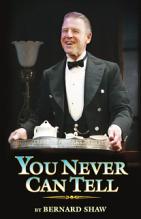You Never Can Tell
Having to watch a dentist performing an extraction would normally launch me into a condition closely approximating hyper-hysteria. Years of painful dental treatment have left me not only with rather fewer teeth and a much-reduced bank balance, but also an indescribable terror that makes me break into a sweat even as I pass a dentist's surgery on the street! However, on this occasion I managed to retain my composure and dignity during the opening scene of this production of George Bernard Shaw's 'You Never Can Tell'.
The dentist in question here is one Mr Valentine (played by Ryan Kiggell). He's a 'five shilling' dentist because all his dental treatments cost five shillings (contrast this with my £500 dentist who never charges less than that amount!). However, Mr Valentine is unique in my experience of dentists in that he is broke, owing 6 weeks' rent to his landlord. However, his luck has just changed because his first client is sitting in his chair as the play begins. The patient is Dolly (played by Sínead Matthews) who is the younger daughter of Mrs Clandon. She bravely faces the extraction without 'gas', and then proceeds to interrogate Valentine with numerous questions about his practice and personal life. Soon, her twin brother Phil as well as her mother and elder sister, Gloria, arrive to collect her. Mrs Clandon (ably played by Diana Quick) is separated from her husband, and the children have been raised in Madeira knowing nothing of their father, but seem intensely inquisitive to find out about him. By an unlikely coincidence, it's not long before they bump into him in the English seaside hotel they're staying at.
Mrs Clandon is an author who writes 'Twentieth Century Guides' on almost any subject under the sun, which her children can merrily quote from memory. As the story unfolds, we learn that she left her husband in order to protect her children from his authoritarian and hard-hearted Victorian attitudes. Thus, the play contrasts the values of the nineteenth with the up-coming twentieth centuries, and the role and status of women and men.
The title of Shaw's play sounds like one of those introductory phrases you come across in 'complete the following sentence' competitions: "You never can tell ... (complete in less than 25 words). I'm not sure how Shaw's play helps us to complete it, if that were indeed the intention. But the phrase is actually used repeatedly as a matter-of-fact statement by the wise old hotel waiter, played by Edward Fox, who sounds like he's recovering from a bad case of tonsillitis when we first meet him in Act 2. Fortunately, his gravelly pronunciation improved as the play wore on, leaving him sounding even more like an old Etonian than his QC son (who, thanks to 'the long arm of coincidence', also happens to fetch-up at the hotel in order to take the sea air).
Shaw wrote 'You never can tell' in 1895-96, and described it as a comedy. But it also contains the kind of highly contrived coincidences, such as the family bumping into their estranged father at the seaside, which one finds in farce. Interestingly, the first production went into rehearsal in 1897, but Shaw was unhappy with progress and withdrew it - apparently, the actors didn't understand what kind of play they were performing, and I can sympathise with some of their concerns. First, it's overly long which makes it rather ponderous and unduly protracted. This is largely because Shaw uses a hundred words where a handful would do. And it's exacerbated by the twists and turns, particularly in the relationship that develops between Valentine and Gloria, which seem endless to the point of infuriation. Also, the characters of the 2 younger children seem ill-defined. Though they are supposed to be minors, they merrily swig away at lager and claret cup, and speak as though they had recently taken doctorates in English language. And though they are initially anxious to find out about their father, they soon seem to lose interest once they meet him face-to-face.
Overall, the play is rather stuffy and out-of-date (if not entirely meaningless) for a modern audience. And Peter Hall's direction does nothing to rectify this. Indeed, two young women sitting next to me appeared completely bored during the first half, and I was not surprised when they did not return after the interval.
Although Shaw liked comedies to 'touch' as well as amuse him, I'm afraid 'You Never Can Tell' left me totally unmoved, longing only for the curtain to fall.
What the popular press had to say.....
NICHOLAS DE JONGH for THE EVENING STANDARD says, "Intelligent audiences of all ages and ideologies will relish this elegant Peter Hall production...Enchanting" ROBERT HANKS for THE INDEPENDENT says, "A highly satisfactory production of a not entirely satisfactory play." LYN GARDNER for THE GUARDIAN says, "For all its surface wit, it lacks the lightness of touch needed for any sense of modernity." BENEDICT NIGHTINGALE for THE TIMES says, "What a joy, then, to find [Edward]Fox giving a performance that is as apt as it is enchanting in Peter Hall's revival of the last and sprightliest of Shaw's "plays pleasant". CHARLES SPENCER for THE DAILY TELEGRAPH says, "Delightful production of one of Shaw's sunniest and funniest plays"
External links to full reviews from popular press
The Independent
The Guardian
Daily Telegraph
The Times
Originally published on
